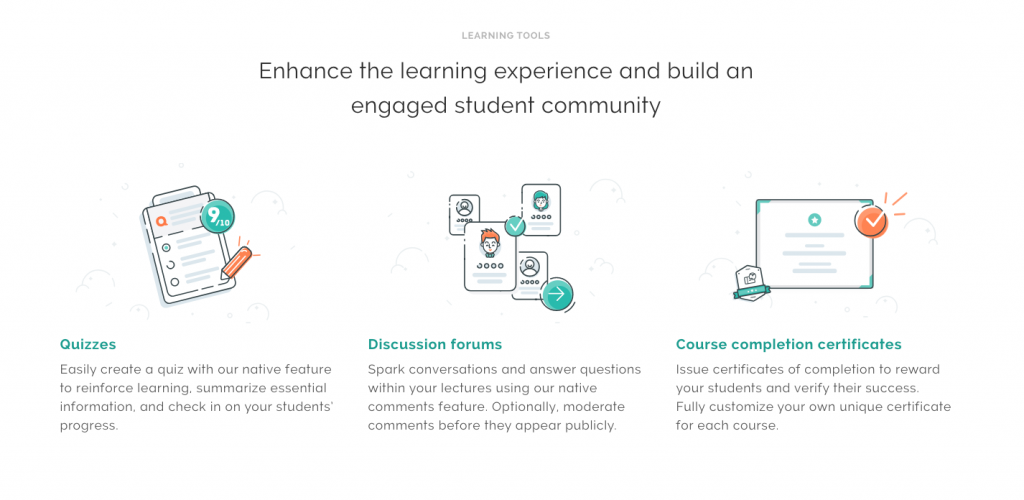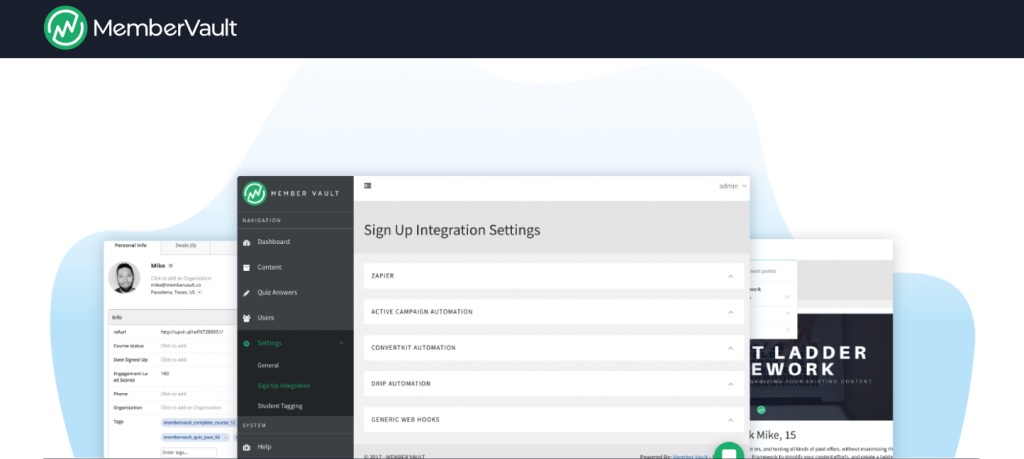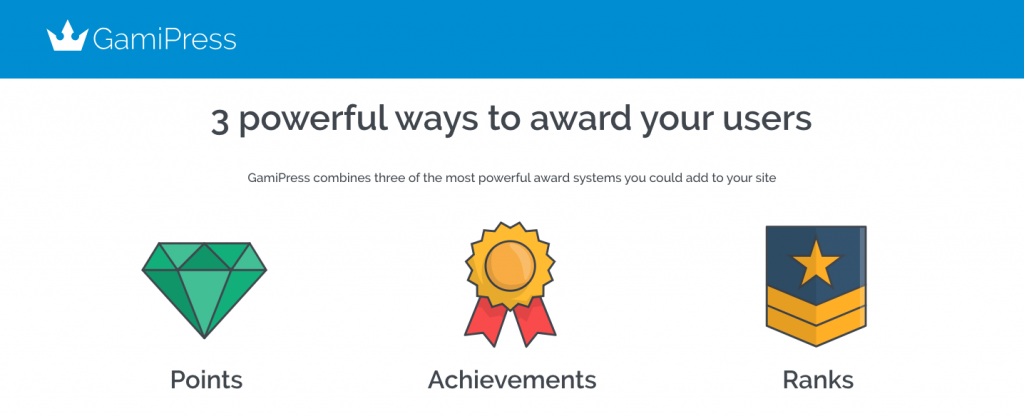The learning space is really heating up!
You can see that there is an overall growing desire for course creation across the board from corporate and creative professionals to entrepreneurs. Looking at Microsoft’s acquisition of LinkedIn in 2016 (who also acquired Lynda.com) is another step towards validating the importance courses will play in building your career. Even though neither companies have proven anything game-changing from any of these acquisitions, the fact that there are billions being invested in the education space is nice for those of use who operate in it.
One thing I’d also like to highlight is fact that there is a major difference between a course platform and a Learning Management System (LMS). I know those two words are thrown out as if they’re synonymous, when in fact they are not. The difference is seen by how platforms handle the learning experience. Let's look at some tools that to help illustrate the difference between a online course platforms and a LMS.
Thinkific Rebrands

Thinkific is definitely a course platform. You will find they have recently gone through a rebrand (which I think looks really good) and you can tell they're really serious about enabling businesses to create courses beyond your average online course creator. Just looking at the pictures in the slider of their homepage you can see they are highlighting personal trainers, speakers, and influencers. Across the new branding you can tell that they are positioning themselves for any business that could benefit from creating courses online.
On top of that, they recently added the ability to build webpages for your courses to provide a more comprehensive experience for your students. I haven’t tested this feature out yet but if you have I’d love to hear below in the comments if you have.
I personally, however, haven't had the best experience using their platform.
Doing things this way requires someone to mark a chapter as complete by viewing an image (if you have it setup like that)
It’s not that they have a bad platform, but I personally prefer other platforms when it comes to the course creation process. There's a few things in there that I just don't agree with the direction they decided to go. The main one is the fact that each chapter can only be of one media type. This means that in order to have an image, text, and a video (which is pretty standard for online courses) you must have 3 separate chapters for each media type. Doing things this way requires someone to mark a chapter as complete by viewing an image (if you have it setup like that). Which, to me, just doesn’t seem optimal or worth tracking in that manner. Now there is a workaround that I found most users are doing. And that’s to use the text block for mixed media which gives you a text editor similar to WordPress where you can embed different types of media.
However, this comes with complications as well. The main one sourcing from how they handle videos. You have to upload your videos to their platform in order to embed them. This really hurt us at ActiveCampaign when I was assessing this tool because we use Wistia which allows you to easily replace a video by uploading it to Wistia and not swapping out the embed code. Since uploading the videos is required by Thinkific (even if your embedding a video) that requires us to upload to both places when we want to update a video. Plus, when you do embed the video the styling looks different than the regular video style chapters. You could add some CSS to fix it but these are all unnecessary extra steps that other platforms get right by default.
With all that being said, I know more than a handful of entrepreneurs that love the tool and have built viable communities and courses on it. Just not my cup of tea.
I am optimistic about their future to see if this external branding is going to have internal implications on how the course creation process flows.
Visit the site here and the new page builder here
Teachable Remaining Solid
Teachable is another course platform I wanted to mention as it’s probably the strongest competitor of Thinkific (or vice versa). Teachable makes visible more easily the features that make it a course platform. Just visiting the features page you can see them highlight quizzes, discussion forums (which are really comments below videos), and course completion certification. These are all standard features any course creating platform should have.

It also points out a difference in approach of the two. Teachable is much more focused on courses where Thinkific’s positioning seems to be more around creating an comprehensive education experience (which I actually think is stronger).
I do think that Teachable's builder is much easier to use. Thinkific’s modular approach to course building reminds me more of a landing page, or page building, platform. That doesn’t necessarily translate well into course creation. Teachable, on the other hand, has done a good job at finding a happy median. It gives you the modular drag and drop ability within each lesson. This allows you to mix media easily within a single lesson, instead of breaking them up into their own.
I find that functionality a lot easier to use. Plus they have a much deeper Zapier integration which is practically required if you want to use automation to aide your students in completing the course.
Speaking of automation, one of the things lacking from Teachable is any form of direct integration with ActiveCampaign
Speaking of automation, one of the things lacking from Teachable is any form of direct integration with ActiveCampaign. This is something that Thinkific has recently added to their platform and I am curious why no movement has been made to do the same on Teachable’s side. I have the feeling a lot of their influencers use tools like MailChimp and Convertkit so they want to remain loyal? Think there’s a huge opportunity there they may be missing.
One of the things in my testing that I really liked with Teachable is how they do their certifications. They not only make it easy to create the certifications but when you complete a course and achieve one they have animated confetti falling which it provides a nice feeling of achievement. Again, a required feature for any course building tool.
You'll need the Professional Plan of Teachable to unlock all of this functionality. Just a heads up.
MemberVault Playing Their Part

I had to opportunity to have both CEO, Erin and lead developer, Mike (they’re a technology and marketing power couple) of MemberVault on the ActiveCampaign Podcast (if you’re not subscribed, please do so now!) and it gave me the opportunity to learn more about their platform.
If you’ve followed me for a while you know how I classify tools like Convertkit. Can’t classify them as email marketing, because they pack more power. Can’t call them a marketing automation platform, because they lack some power. Therefore, they play this hybrid role in between both spaces.
Think of MemeberVault in that manner. A hybrid platform that does everything a course platform does (with the exception of certifications) and does some of what a true LMS does. That “some” is gamification.
Gamification is the process of awarding progression as it takes place to provide motivation to continue. This is usually seen as points awarded for completing steps, badges, and leaderboards.
Given the fact that the majority of your students will NOT complete the entire course they enrolled in, you will need ways to incentivize progression
This is the main feature missing from course platforms today. Given the fact that the majority of your students will NOT complete the entire course they enrolled in, you will need ways to incentivize progression. As I mentioned earlier, tracking their activities in ActiveCampaign is an option to be able to respond to their inactivity. However, it’s not as immediate as gamification. So tying the two together provides something powerful. That’s what MemberVault has done. It has a built in points gamification system and a native ActiveCampaign integration.
They are always adding to the platform as well which is a really good sign. In fact, in July alone I received at least 3 emails from Mike mentioning new features and updates released. It would be nice to see a full gamification experience eventually (badges and leaderboards), but it is nice to have a course building platform with built in gamification available as an alternative to the common course platforms.
Learndash, A True LMS
Time to talk about a true LMS. I have not found another offering for small businesses that matches all of the learning features that LearnDash does for the price (including plugins). You can tell they have really looked at the needs of the education space from, universities to entrepreneurs, and built their tool around it. Though not all native, LearnDash offers the most robust learning management system I've ever used (one of the reasons I use it for my Academy).
It is a WordPress plugin, which may turn some people off, but they have every feature listed in the tools above plus a lot more functionality via plugins and extensions. What’s nice about it is that the plugins that are developed for LearnDash are done very well and integrate with actions that make sense. From Woocommerce payments enrolling new students automatically to creating a more social learning experience with BuddyPress; all of the plugins work really well once integrated.
But more notably gamification plugins that add everything that course platforms are missing. With aide of membership plugins like ActiveMember360, Memberium, and WPFusion, you can have all of your gamification activities tied into your marketing automation. Takes a little bit of technical know-how to configure it all but once you have it in place it is powerful!
Instead of logging in with your mobile browser your online school would exist as an app on the phone
This month they took a leading step towards mobile. Partnering with AppPresser and AppBoss you now have the option to build a mobile app for your online courses. This would allow you to take your courses and create a mobile app where people can go through the learning process on their phone in a mobile optimized way.
This is different from the mobile optimized experience of a website. Instead of logging in with your mobile browser your online school would exist as an app on the phone. All information, and progress, would be linked back to your regular LearnDash install, so when they access their courses on a computer they will not lose any of their progress.
The mobile experience beyond the browser is something course creators have to start thinking about because it makes learning more easily accessible. Whether you're commuting, on a work break, traveling, or just any place waiting; you will more than likely be using your phone or a mobile device to help pass the time. Why not have your course be an option? I haven't seen many platforms focus on this mobile possibility so it'd be interesting to see going forward how LearnDash pulls it off.
Gamification Simplified with Gamipress

I’ve mentioned gamification quite a few times so I would remiss to not include a solution. I currently use BadgeOS for my Academy as a way of awarding badges when someone completes a specific activity. Since I use ActiveMember360 I am able to even award badges based on tags present on their contact record in ActiveCampaign (powerful stuff here).
As powerful as the setup is it took me awhile to get everything integrated correctly. Mainly because the BadgeOS documentation was very technical and there’s not a lot of helpful blogs or forums to help with the process. Unfortunately, people have put up with it since they have been the only viable offering for WordPress. That all changed when I found a new plugin called Gamipress.
They also have a built in leaderboard where all your students can compare points and progress to provide a bit of friendly competition.
Gamipress feels a lot like BadgeOS but is much easier to configure and get up and running. It, of course, integrates with LearnDash and has a few other features that were a pleasant surprise like emailing badges upon achieving them (if you view the email in a desktop browser you’ll even see a confetti animation). Another was the ability to set a name for points your students can acquire. You can customize them to be called “gems”, “coins”, or whatever you want your academic currency to be called to better match your learning experience. Lastly, they also have a built in leaderboard where all your students can compare points and progress to provide a bit of friendly competition.
One of the major things that really sold me early is the amount of add-ons they have to extend their functionality even more. So I decided to give them a go and I really liked it.
They have a BadgeOS importer that once I ran essentially maintained all of my original styling and CSS which was a huge relief. In fact, if you’ve enrolled in any of my courses you may have received email notifications regarding the badges you’ve unlocked. This was purely accidental as the plugin has a retroactive feature that allows you to grant badges off prior activities logged before the plugin was activated. This is great and worked great, besides the fact that email notifications are enabled by default. Which of course is the reason why my students received a number of emails at once (sorry about that).
I’ve asked Bob Keen (creator of ActiveMember360) to take a look at the plugin and see if it’s feasible to mirror a deep integration as he has done with BadgeOS. Let’s hope!
Check out the Gamipress WordPress plugin here
Honorable Mentions
This, of course, is not an exhaustive list of all course creating platforms available for business owners and educators. Other tools worth mentioning, in no particular order of importance, are: Lifter LMS, WP Courseware, Kajabi, OptimizePress, LearnPress, and many more I’m probably forgetting to mention. With many of these platforms you'll be able to track your progress, pickup where you left off and potentially get a certification.
The list is a lot more limited for the LMS side of things for small businesses. You will see the list grow as you move up into the enterprise space. I think this will start changing as the education space begins to become more tightly coupled with the marketing space. There’s no way platforms like Teachable would be enough for a company wanting to offer compliance and HR training for their employees. From both a security and feature perspective.
However, just like marketing automation, these LMS features should not (and will not) be limited to just enterprise companies.
So the short list of LMS platforms include Lessonly (which we use internally at ActiveCampaign, which is the only reason I mention it because it can get expensive quickly) and another company that has reached out to me individually called LearnUpon. From my research it’s the closest thing to a self-hosted LMS platform that offers all of the functionality mentioned above for a price that won’t break your small business bank.
There you have it. Hopefully this report helped you clarify if your needs match those of a course platform or full LMS. Either way the end goal should be increasing engagement and course completion. However you can achieve that in your business is fine by me ;).
Drop a comment and let me know which side you're leaning more towards. Would your business benefit more from a course building platform or a true LMS?
